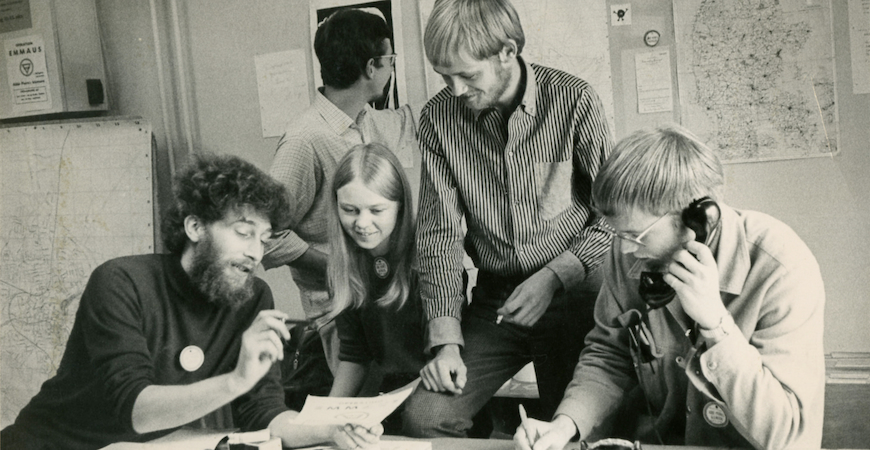Summer camps: committed youth and new vocations
Summer camps have been at the heart of the Emmaus movement since the 1960s. These gatherings have shaped the movement as it is today and were the starting point for many “vocations” within Emmaus. Let us take a look at how these social and solidarity events work.
Before we delve into the history of the summer camps, what camps are available for young people in 2024?
This year once again, several groups in Europe and in France are opening their doors to young people who would like to get involved!
Emmaus Lisbon is one of them, offering a two-week immersion within the community, between 1st July and 1st September. This immersion will involve participating in community life with the Emmaus companions and getting involved in the organisation’s business activities: collecting donations, sorting stock, shop management, upcycling and gardening. This year, Emmaus Lisbon is also organising a Solidarity Festival throughout the summer: each group of volunteers will be actively involved in highlighting forgotten causes! Every fortnight will end with a concert (DJ set, jam sessions, etc.). Getting involved in a solidarity project is above all meaningful, but it is also about sharing unforgettable moments!
Other Emmaus groups in Italy, Belgium, Bosnia and Herzegovina and in France organise camps throughout the summer months.
How can I find out more and apply, or sign up for a camp?
For summer camps outside of France, all the groups’ initiatives can be found on the Emmaus Europe web page devoted to this topic. For France, all the information can be found on this page on Emmaus France’s website. And to find out more, you can also contact Emmanuel!
How did the summer camps begin?
It is impossible to dissociate the growth of the Emmaus movement around the world from the development of the summer camps. They started during the 1960s in Normandy to encourage young people to get involved and combat poverty.
During the summer, these “international work camps” operated like real Emmaus communities: door-to-door collections of donations, and sorting, repairing or reselling of second-hand goods. At the time, the summer camps were organised voluntarily by young people for other young people, “out of thin air” (with no budget). They raised funds that were redistributed to benefit solidarity projects within the country and internationally, with a portion used to develop new Emmaus projects. They could also be used to set up a fund and a group of volunteers to create a friends’ committee or a community on a new site.
These international youth camps quickly resulted in thousands of young people of different nationalities gathering together, in France as well as in Italy and Denmark. Between June and October 1972, the camp in Bourgogne drew 4,500 young people of 44 nationalities together!
After an international camp, it was not unusual for young people who had discovered Emmaus to become leaders of a new community and/or meet the love of their life! Little by little, these camps led to the development of many groups in France and abroad.
Is it dangerous to get involved in a summer camp?
Very dangerous! Even today, there is a significant risk of getting stuck in the Emmaus galaxy and dedicating your life (or at least a large part of it) to fighting poverty and exclusion after you have been at a summer camp, bringing meaning to your life in the long term.
In fact, after experiencing their first summer camp, many decide to get more involved and even go on to set up an Emmaus living community or a friends’ committee!
Word to the wise….will we meet again on the ground?

Camps internationaux de jeunes au Danemark, 1969. Photo issue des archives de l’abbé Pierre et d’Emmaüs International déposées aux ANMT (Roubaix).



